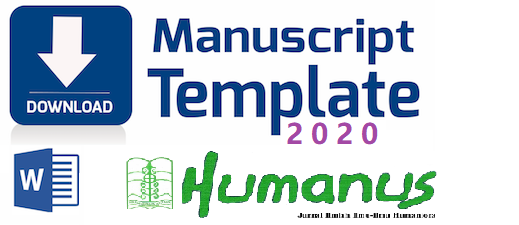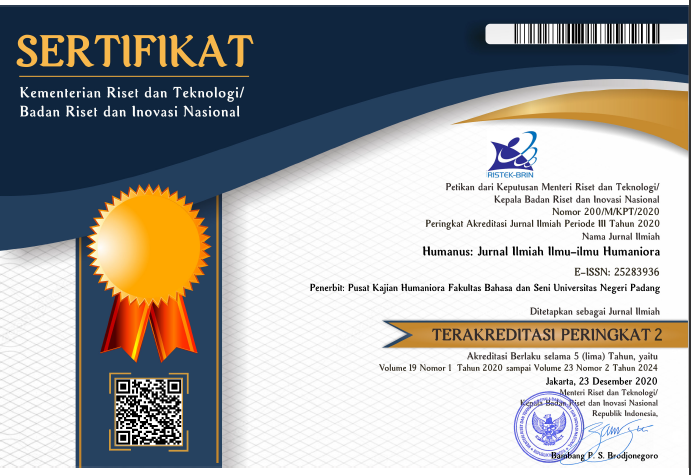Politeness in Criticizing Political Discourse: A Model Design
 ), Srimutia Elpalina(5),
), Srimutia Elpalina(5), (1) Universitas Negeri Padang
(2) Universitas Negeri Padang
(3) Universitas Negeri Padang
(4) Universitas Negeri Padang
(5) Universitas Negeri Padang
 Corresponding Author
Corresponding Author
Copyright (c) 2023 Humanus: Jurnal Ilmiah Ilmu-ilmu Humaniora
DOI : https://doi.org/10.24036/humanus.v22i1.119986
Full Text:
 Language : en
Language : en
Abstract
Keywords
References
Adek, M., & Agustina, A. (2021). Indonesian Civil War: Comparing Discourse in the Campaign of Jakarta’s 2017 Gubernatorial Election. Komposisi: Jurnal Pendidikan Bahasa, Sastra, dan Seni, 22(1), 17-31.
Agustina. (2017). Politeness in Language by the Politicians in the Discourse of Jakarta Election. 148(Icla 2017), 105–112. https://doi.org/10.2991/icla-17.2018.20
Agustina. (2018). Manifestation of Religious Ideology in Public Comments on the Discourse of The 2017 Jakarta Election News in Social Media. 263(Iclle), 409–414. https://doi.org/10.2991/iclle-18.2018.69
Agustina, Gani, E., & Nurizzati. (2020). Typology of verbal violence in political discourse: Codification of sociolinguistics. Journal of Advanced Research in Dynamical and Control Systems, 12(6), 928–938. https://doi.org/10.5373/JARDCS/V12I6/S20201112
Ainim, S., Adek, M., & Rahmi, A. (2020, November). Light and Shadow in Hate-Speech Cases: A Forensic Linguistics. In The 3rd International Conference on Language, Literature, and Education (ICLLE 2020) (pp. 15-22). Atlantis Press.
Badan Pusat Statistik. (2010). Indeks Demokrasi Indonesia 2010. http://idiproject.org/index.php/en/download/finish/2/4
Farias, D. I. H., & Rosso, P. (2017). Irony, Sarcasm, and Sentiment Analysis. Sentiment Analysis in Social Networks, 113–128. https://doi.org/10.1016/B978-0-12-804412-4.00007-3
Faser, B. (2014). The domain of pragmatics. Language and Communication, 28–57. https://doi.org/10.4324/9781315836027-7/DOMAIN-PRAGMATICS-BRUCE-FRASER
Filik, R., Brightman, E., Gathercole, C., & Leuthold, H. (2017). The emotional impact of verbal irony: Eye-tracking evidence for a two-stage process. Journal of Memory and Language, 93, 193–202. https://doi.org/10.1016/j.jml.2016.09.006
Filik, R., Hunter, C. M., & Leuthold, H. (2015). When language gets emotional: Irony and the embodiment of affect in discourse. Acta Psychologica, 156, 114–125. https://doi.org/10.1016/j.actpsy.2014.08.007
Firmansyah, A. U., Agustina, & Tressyalina. (2020). Sarcasm and Cynicism in Political Discourse on the 2017 DKI Jakarta Regional Election on Social Media. 485(Iclle), 1–6. https://doi.org/10.2991/assehr.k.201109.001
Gani, E., Agustina, Asri, Y., & Humaira, L. H. (2020). Realization of Criticism in Political Discourse and Its Impact on Advance Threats and Polite Language. 485(Iclle), 43–49. https://doi.org/10.2991/assehr.k.201109.007
Geis, M. L., Cole, P., & Morgan, J. (1976). Syntax and Semantics Volume 3: Speech Acts. In The Modern Language Journal (Vol. 60, Issue 5/6, p. 301). https://doi.org/10.2307/324613
Gunarwan, A. (1996). The speech act of criticinzing among speakers of Javanese. In Makalah Dipresentasikan dalam Pertemuan ke-6 South East Asian Linguistics Society. Tidak diterbitkan.
Hardini. (2014). Wakil Gubernur Jawa Tengah Periode 2013-2018. Jurnal Penelitian, 11(2), 301–316.
Hasanah, U. (2019). Mengkritik Elit Politik pada Pilpres 2019 Halaman 1 - Kompasiana.com. https://www.kompasiana.com/uswatunhasanah7314/5bb0df046ddcae34b556f76d/mengkritik-elit-politik-pada-pilpres-2019
Heriyanto, G. (2021). Skor Indeks Demokrasi Indonesia Membaik, tetapi Tantangan Masih Besar - Kompas.id. Kompas.Id. https://www.kompas.id/baca/polhuk/2022/02/14/peningkatan-skor-indeks-demokrasi-2021-tak-serta-merta-tandai-perbaikan-kualitas-demokrasi-indonesia
Herman, H., & Manaf, N. A. (2022). Jurnal basicedu. Jurnal Basicedu, 6(4), 6078–6087. https://doi.org/10.31004/basicedu.v5i4.1230
Humairah, L. H., Agustina, & Manaf, N. A. (2019). Ideologi Sekularisme Dalam Komentar Masyarakat Tentang Wacana Pilkada Dki Jakarta Di Media Sosial. RETORIKA: Jurnal Bahasa, Sastra, Dan Pengajarannya, 12(2), 177. https://doi.org/10.26858/retorika.v12i2.8627
Jauhari, Edy. (2017). Strategi Kesantunan Respon terhadap Kritik dalam Masyarakat Budaya Jawa Mataraman. https://fib.unair.ac.id/fib/2022/08/22/strategi-kesantunan-respon-terhadap-kritik-dalam-masyarakat-budaya-jawa-mataraman/
Keraf, G. (2007). Diksi dan Gaya Bahasa. Jakarta: Gramedia.
Lakoff, R. (1972). Language in Context. Language, 48(4), 907. https://doi.org/10.2307/411994
Leech, G. (1993). Prinsip-prinsip Pragmatik. Jakarta: Universitas Indonesia.
Levinson, S. C. (1987). Pragmatics. Cambridge: Cambridge University Press.
Nguyen, T. T. M. (2005). Pragmatic development in L2 use of criticisms: A case of Vietnamese EFL learners. EUROSLA Yearbook, 5(1), 163–194. https://doi.org/10.1075/EUROSLA.5.09NGU
Nguyen, T. T. M. (2008). Criticizing in an L2: Pragmatic strategies used by Vietnamese EFL learners. Intercultural Pragmatics, 5(1), 41–66. https://doi.org/10.1515/IP.2008.003
Parker, F. (2005). LINGUISTICS FOR NON-LINGUISTS: A Primer with Exercises, 4/e. https://www.academia.edu/11562558/LINGUISTICS_FOR_NON_LINGUISTS_A_Primer_with_Exercises_4_e
Penelope Brown, S. C. L. (1996). Politeness: Some Universals in Language Usage. Cambridge University Press.
Pohjonen, M., & Udupa, S. (2017). Extreme speech online: An anthropological critique of hate speech debates. International Journal of Communication, 11(312827), 1173–1191.
Prayitno, J. H. (2009). Perilaku Tindak Tutur Berbahasa Pemimpin Dalam Wacana Rapat Dinas: Kajian Pragmatik Dengan Pendekatan Jender. Kajian Linguistik Sastra, 21(2), 132–146.
Rahmadani, N., & Agustina. (2020). The Criticizing Strategies by the National Campaign Team (TKN) and the National Winning Agency (BPN) in the 2019 Presidential Election Debate. 463, 276–282. https://doi.org/10.2991/assehr.k.200819.056
Revita, I. (2018). Kecerdasan Linguistik dalam Beretorika. http://repo.unand.ac.id/22023/23/kecerdasan linguistik dalam beretorika 20 oktober.pdf
Searle, J. R. (1969). Speech Acts: An Essay in the Philosophy of Language. https://doi.org/10.1017/CBO9781139173438
Spradley, J. P. (1997). Metode Etnografi. Yogyakarta: Tiara Wacana.
Sundari, W., Agustina, & Ermanto. (2019). Ideology in Politicians’ Comments on DKI Jakarta Election Discourse in Twittpolitik Free People. 301(Icla 2018), 613–616. https://doi.org/10.2991/icla-18.2019.100
Toplak, M., & Katz, A. N. (2000). On the uses of sarcastic irony. Journal of Pragmatics, 32(10), 1467–1488. https://doi.org/10.1016/S0378-2166(99)00101-0
Wajnryb R. (1993). Strategies for the management and delivery of criticism. | English Australia Journal. https://search.informit.org/doi/abs/10.3316/aeipt.212230
Wajnryb R. (1995). The perception of criticism : one trainee’s experience. | English Australia Journal. https://search.informit.org/doi/abs/10.3316/aeipt.113515
White, A. R., Austin, J. L., & Urmson, J. O. (1962). How to Do Things with Words. In Oxford (Vol. 23, p. 58). Oxford At The Clarendon Press. https://doi.org/10.2307/3326622
Wibowo, K. (2021). Indeks Demokrasi 2020: Indonesia Catat Skor Terendah dalam 14 Tahun Terakhir. Detiknews. https://news.detik.com/dw/d-5361657/indeks-demokrasi-2020-indonesia-catat-skor-terendah-dalam-14-tahun-terakhir
Wicaksono, G. (2011). Tindak Tutur Ekspresif pada Rubrik Gambang Suling di Majalah Jaya Baya. Skripsi. Semarang: Universitas Negeri Semarang.
Wijana, I. D. P. (1996). Dasar-dasar Pragmatik. Yogyakarta: Andi Offset.
Yule, G. (1996). Pragmatics. Oxford: Oxford University Press.
 Article Metrics
Article Metrics
 Abstract Views : 453 times
Abstract Views : 453 times
 PDF Downloaded : 109 times
PDF Downloaded : 109 times
Refbacks
- There are currently no refbacks.
Copyright (c) 2023 Humanus: Jurnal Ilmiah Ilmu-ilmu Humaniora

This work is licensed under a Creative Commons Attribution-NonCommercial 4.0 International License.










